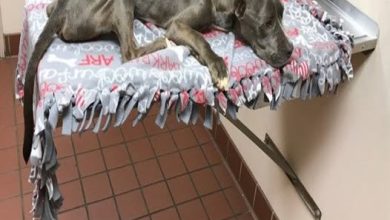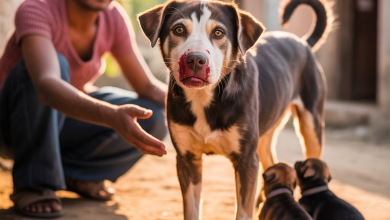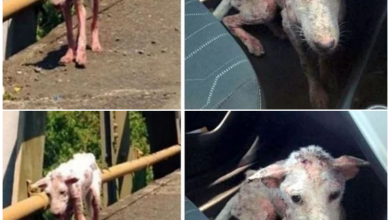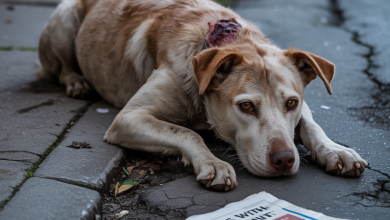The Dog Who Fought a War: Boby’s Journey from Cancer-Stricken Stray to Beacon of Hope
The sun in Hermosillo, Mexico, is a relentless force. It beats down on the dusty streets, baking the asphalt and bleaching the vibrant colors of the city to a hazy, uniform beige. It’s a city of noise and motion, of bustling markets and the constant hum of traffic. In such a place, it’s easy to become invisible, especially if you are small, silent, and broken. On these sun-scorched streets, a young dog was fading away, not with the gentle grace of old age, but with the brutal, premature decay of disease and neglect. His name was Boby, and he was a ghost walking in the blinding light of day.
To the casual observer, Boby was just another stray, one of the countless unfortunate souls navigating a life of scarcity on the city’s margins. But a closer look would have revealed a tragedy far deeper than mere homelessness. Boby was only two years old, an age when a dog should be a whirlwind of boundless energy, his body a finely tuned instrument of play and joy. But Boby’s young body was a prison of pain. It was gaunt and skeletal, his malnourished frame a testament to a constant, gnawing hunger. And it was covered in tumors. Lumps and growths distorted his skin, some raw and painful, a cruel topography of the cancer that was consuming him from within.
His days were a monotonous, agonizing loop. He would wander the streets, his steps slow and deliberate, conserving what little energy he had. He was on a desperate, endless search for two things that were almost impossible to find: a morsel of food and a moment of comfort. He would sniff around the edges of outdoor cafes and poke his nose into overflowing trash bins, often chased away with a harsh word or a thrown stone. The pain from his tumors was a constant companion, a dull, throbbing ache that never subsided. He would find shade where he could, collapsing under a parked car or in the sliver of shadow cast by a building, his breathing shallow, his eyes clouded with a weariness that did not belong in a dog so young. He was a paradox of youth and decay, a life just beginning that was already perilously close to its end.
It is a sad truth that we learn to unsee suffering when it becomes commonplace. People walked past Boby every day. They saw him, but they didn’t truly see him. They saw a dirty stray, a problem, a nuisance. They did not see a terrified two-year-old fighting a losing battle against a monstrous disease, a gentle soul who yearned for a kind touch and a soft place to rest. But one day, one fateful, ordinary Tuesday, a pair of eyes saw him differently. They belonged to a woman named Dalia Gámez, and in her gaze, Boby was not invisible. He was everything.
Dalia was an animal rescuer, but that title is too simple; it doesn’t capture the essence of who she was. She was a warrior of compassion, a woman who chose to walk toward the suffering that others turned away from. Her life was a tapestry woven with the stories of the broken, the abandoned, and the forgotten. Every day was a battle against indifference, her car a rolling sanctuary filled with blankets, food, water, and a first-aid kit. Her heart was a catalog of sorrows and triumphs, each rescue leaving its own indelible mark.
On this particular day, Dalia was feeling the weight of it all. The rescues had been difficult lately, the need seemingly endless, the resources frustratingly finite. She was driving through a part of town she didn’t usually frequent when she saw him. Boby was standing at a street corner, hesitant to cross, looking utterly lost and defeated. It wasn’t just his shocking physical state that stopped Dalia in her tracks. It was the look in his eyes. It was a look of quiet, profound despair, a surrender to the cruelty of his fate. In that instant, Dalia’s weariness vanished, replaced by a surge of fierce, protective determination. This dog would not die on this street. Not today.
She pulled her car over and approached him slowly, her movements calm and non-threatening. She spoke to him in a low, gentle voice that was a stark contrast to the harsh sounds of the city. “It’s okay, little one,” she murmured. “I’m here now. I’m going to help you.”
Boby flinched at first, conditioned to expect a kick or a shout. But Dalia’s energy was different. He saw no threat in her soft eyes, only an overwhelming wave of kindness. When she knelt on the hot pavement and offered him a small piece of chicken from her emergency stash, he took it with a delicacy that belied his ravenous hunger. He was broken, but his gentle spirit was still intact. Trusting an instinct he must have thought was long dead, he allowed Dalia to loop a soft slip lead over his head.
The journey to the veterinary clinic was a silent, sacred passage. For Boby, it was the first time in a long time he had been inside a car, the first time he had felt the cool rush of air conditioning on his feverish skin. He lay on the back seat, too weak to sit up, and watched Dalia in the rearview mirror. He was leaving the only world he knew, a world of pain and hunger, and heading toward an unknown future. For the first time in a very long time, a tiny, fragile seed of hope began to sprout in his weary heart.
At the clinic, the reality of Boby’s condition came into sharp, devastating focus. The veterinarian, a kind and seasoned man named Dr. Ramirez, examined Boby with a gentle touch that spoke of years of experience. As he felt the numerous tumors and assessed Boby’s emaciated frame, a grim expression settled on his face. He drew blood and took samples for a biopsy, his movements efficient but somber.
Dalia waited, her stomach in knots. She had rescued hundreds of animals, but the waiting never got any easier. Finally, Dr. Ramirez came out to speak with her, his face etched with a sorrowful gravity.
“The news is not good, Dalia,” he began, his voice low. “It’s a transmissible venereal tumor, a form of cancer. It’s aggressive, and it has spread significantly.” He paused, taking a deep breath. “The worst part is his age. Our best guess is that he’s only about two years old.”
The words hit Dalia like a physical blow. Two years old. He was just a baby. He should have been chasing balls, not fighting for his life.
“Can we treat it?” she asked, her voice barely a whisper.
“We can try,” Dr. Ramirez said, his tone cautious. “The standard treatment is chemotherapy. It can be very effective for this type of cancer. But, Dalia… look at him. He has no body fat, no reserves. He’s severely anemic and malnourished. Frankly, I’m not sure his body can handle the toxicity of the chemo. The treatment itself could kill him.”
It was a cruel, impossible choice. To do nothing was to condemn Boby to a slow, painful death on the streets. To pursue treatment was a massive gamble, a potentially torturous path that he might not even survive. Dalia looked through the glass window into the examination room where Boby was now lying on a soft blanket, a weary soldier in a war he didn’t understand. She looked at his young face, at the flicker of life that still remained in his tired eyes. To the world, he was a lost cause, a statistic. But to Dalia, he was a life, precious and unique, and it was a life worth fighting for.
“We have to try, Doctor,” she said, her voice filled with a conviction that surprised even herself. “We have to give him a chance. If there’s even a one percent chance, we have to take it.”
Dr. Ramirez looked at her, then back at the dog, and a slow smile touched his lips. It was this fire in Dalia, this refusal to surrender to the odds, that he admired so much. “Alright,” he said. “Let’s give this boy a fighting chance. Let’s go to war.”
And so began Boby’s long and arduous battle. Chemotherapy for a dog is a grueling ordeal, just as it is for a human. There were days when the potent drugs left him weak, nauseous, and with no appetite. On those days, Dalia would be there. She would hand-feed him a special recovery diet, a few bites at a time. She would sit on the floor of his kennel at the clinic, her hand resting gently on his side, speaking to him for hours in that same soft, soothing voice she had used on the day she found him. She became his anchor in a sea of sickness and confusion. He learned that her presence meant comfort, safety, and unwavering love.
But there were good days, too. Days when the clouds of nausea would part, and a glimmer of the puppy he was meant to be would shine through. He would greet Dalia with a weak but genuine tail wag. He would take a few playful steps, batting at a soft toy with his paw. These small victories were monumental, fueling the hope of everyone involved in his care.
Dalia knew she couldn’t fight this war alone. The cost of Boby’s intensive treatment was staggering. She decided to share his story. She started a Facebook page, posting photos of Boby—not just the heartbreaking images of his condition, but photos that captured his gentle spirit and his incredible bravery. She wrote about his diagnosis, his fighting chance, and his sweet, loving nature. She didn’t just ask for donations; she asked people to become a part of his journey, to be his cheerleaders.
The response was overwhelming. Boby’s story struck a chord, spreading like wildfire through the community and beyond. People were moved to tears by the plight of this young dog who had been dealt such a cruel hand. Small donations began to pour in, five dollars here, ten dollars there. But more than the money, it was the messages of support that sustained Dalia and the clinic staff. Strangers from all over the world were rallying behind Boby. He was no longer a forgotten stray; he was a symbol of hope, a beacon of resilience that inspired everyone who heard his story. He had a global family fighting right alongside him.
Week after week, Boby endured his treatments. And slowly, miraculously, a change began to occur. The tumors started to shrink. The raw sores on his skin began to heal. He started to gain weight, the sharp angles of his bones softening under a new layer of healthy muscle. The clouded, weary look in his eyes was replaced by a bright, clear light. He was winning.
As Boby’s health improved, his true personality blossomed. He was a playful, goofy, and incredibly affectionate dog. He loved to cuddle, to give sloppy kisses, and to play with the other dogs at the rescue center where Dalia now kept him. His transformation was breathtaking.
Among the hundreds of people following Boby’s story online was a family who lived a few towns over. They had been captivated by his journey from the very beginning. They had celebrated his victories and grieved his setbacks. They had fallen in love with his indomitable spirit through a computer screen. As Boby neared the end of his treatment and the vet declared him to be in remission, they reached out to Dalia. They didn’t just want to donate; they wanted to offer Boby what he deserved more than anything: a forever home.
For Dalia, this was the moment she had been fighting for, the ultimate goal of every rescue. But it was also a moment of profound, heart-wrenching difficulty. Over the months of his treatment, Boby had become more than just a rescue to her. She had poured her soul into his recovery. He was her miracle dog, their bond forged in the fires of his battle for life. The thought of letting him go was almost unbearable.
She met with the family. They were kind, loving people with a warm home, a big yard, and two happy, well-adjusted dogs who could be Boby’s new siblings. They understood his medical history and were prepared to give him the life of love and security he had been so cruelly denied. They were, in a word, perfect.
Dalia knew what she had to do. True love, especially the love of a rescuer, is often about letting go. It’s about prioritizing the animal’s ultimate happiness above one’s own attachment. With a heavy heart but a clear sense of purpose, she made the decision. It was time for Boby to go home.
Their last day together was filled with a bittersweet tenderness. Dalia took him for a long walk, gave him his favorite treats, and held him close, whispering promises that he would be loved and cherished forever. The handover was emotional, filled with tears from both Dalia and the new family. As Boby eagerly jumped into his new family’s car, turning to give Dalia one last, happy lick, she knew she had made the right choice. Her part in his story was over, but his best chapter was just beginning.
Today, Boby is the picture of transformation. He is no longer a ghost on the streets of Hermosillo. He is a beloved pet, a cherished member of a family. His cancer remains in remission, and his body is strong and healthy. His days are filled with everything a dog could ever dream of: long naps on a soft couch, games of fetch in a green, grassy yard, romps with his canine siblings, and an endless supply of cuddles and love. He is happy. He is healthy. He is home.
Boby’s journey is a powerful testament to the magic of second chances. It is a story about the power of compassion to stare down despair and to choose hope against all odds. It is about the selflessness of a rescuer, the skill of a veterinarian, the kindness of a community, and the incredible, unbreakable will of one very special dog. From the dusty, unforgiving streets to a life of boundless joy, Boby’s story reminds us that no life is a lost cause, and that the war for a single, precious life is always a war worth fighting.




